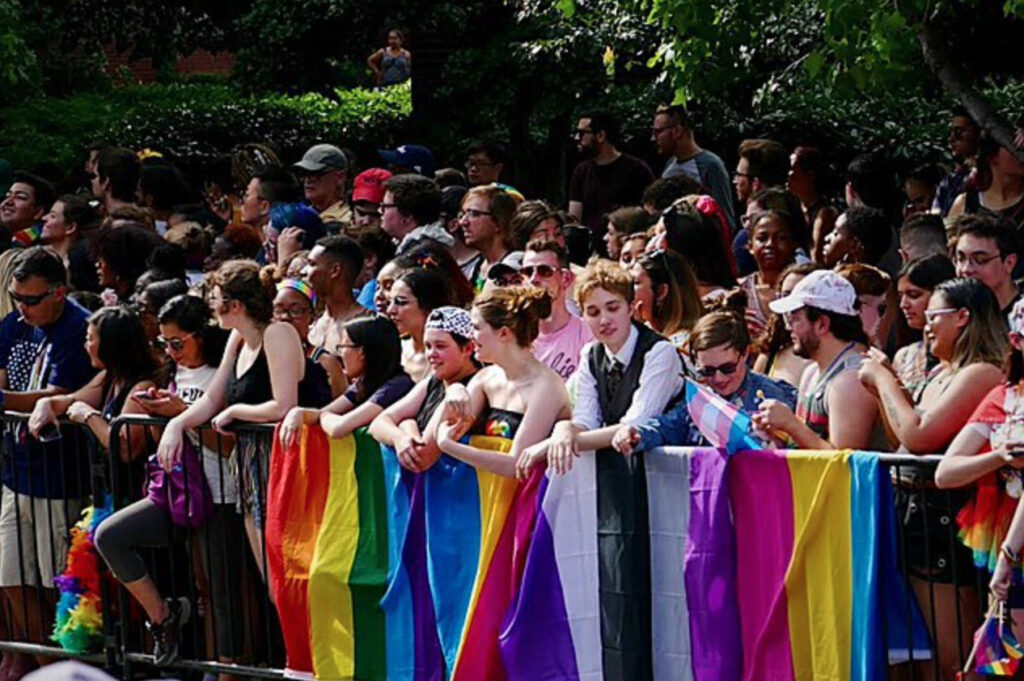LOS ANGELES — The place you are born can determine many things about your life. For example, country demographics tell us that you are likely to be Muslim if born in Saudi Arabia, have a fish-filled diet if born in Barbados, or live to be at least 80 years old if born in Japan. For millions of people around the world, where you’re born can also create a set of circumstances and an environment that questions the validity, legality and survivability of your existence.
Members of the LGBTQ+ community, in particular, face a host of economic, social, political and cultural challenges in Western democracies; but in more socially conservative countries or in countries with less democratic political systems, these challenges are amplified. In 2021, queer people’s right to existence is still questioned around the world.
According to the UCLA Law’s Williams Institute, about 3.5% of the world’s population openly identify as lesbian, gay or bisexual, while 0.5-1% are transgender. This statistic, however, does not account for people who may be hiding their identities. Overall, approximately 1 in 20 people struggle with sexual or gender discrimination to some degree.
Being part of the LGBTQ+ community is criminalized in 71 countries, with nearly every region of the world represented in this group. From these countries, 15 directly criminalize transgender identities and 11 allow the death penalty as punishment for LGBT individuals.
In addition to legislation that condemns LGBTQ+ people to imprisonment and executions, many also face ostracization and discrimination in their country regardless of the legal environment. Without any legal protections in place, queer people are vulnerable to several forms of abuse and discrimination from social, professional and educational spaces, which often goes unpunished.
This violence reveals itself in the death toll of transgender people. In 2020, an all-time high of 350 transgender people were murdered around the world due to gender identity, increasing from 331 people in 2019. The majority of these murders happened in Latin America. The indisputably largest proportion of deaths came from Brazil, with 43%, tailed by Mexico, with 17%.
Despite the global lack of acceptance of queer people, there are large disparities in treatment. Statistically, a transgender person born in Denmark, which is notably ranked fourth in the Human Freedom Index, has access to medical aid while transitioning, equal opportunities in comparison to their cisgender peers, and an overall freedom of self. In contrast, a transgender individual born in Brazil lives in a dangerous environment, with the highest death toll for transgender people worldwide. And in Brazil, economic disparities and lack of economic mobility severely hinder efforts to transition.
Religion also plays a significant role in shaping global and national attitudes towards queer identities. In many Muslim countries, for instance, anti-LGBTQ+ laws use interpretations of the Quran as justification for certain policies. In Latin American and predominantly Catholic countries, negative views towards gay and transgender people are perpetuated by the select biblical interpretations of gender, sexuality, marriage and sin.
Poland is a primary example of a country that, in the name of religion and maintaining conservativism, has taken several strides to discriminate against homosexuality and transgender identities.. In 2019, around 100 municipalities — roughly one third of the entire country — declared themselves “LGBT free zones,” or areas self-designated as clear of any LGBTQ+ “ideologies” or lifestyles.
Several stories from LGBTQ+ Polish people were highlighted by global media when these “free zones” started to appear. Bartosz Staszewski, a prominent LGBTQ+ rights activist was interviewed by CBC, a Canadian news network at this time. During the segment, he said that these zones were “a sign that the politicians will not represent their [LGBTQ+ people] problems in city council, that they will not treat them as equal to other members of these communities; that they are a threat.”
Although these areas were quickly condemned by the European Union, Poland has maintained their right-wing ideology and their newly reelected conservative president, Andrzej Duda, is a very outspoken critic of LGBTQ+ rights. Duda has stated that “LGBT people are not people.”
From Europe to the Middle East, this discrimination runs rampant — even in countries that pride themselves as progressive hubs. For example, while the United Arab Emirates markets itself as a popular travel destination and a progressive countries in the region, there have been many cases of LGBTQ+ people facing discrimination.
In one case that caused a media controversy, internet celebrity Gigi Gorgeous was denied entry into Dubai in 2016 due to her transgender identity, risking imprisonment if she did not leave the country. Officials cited an Emirati law within the country’s penal code that prohibits “men from impersonating women,” and punishes the act with jail time.
This law has put many people behind bars. Human Rights Watch highlights that when interviewing two Singaporean nationals that were imprisoned in 2017 for “crossdressing” (a subjective term that, in this case, alluded to the pair’s clothing styles), they mentioned that the jail they were put in was specially designated for “effeminate” detainees. This law, iterations of which exist beyond the UAE, also subjects queer people to biased profiling, allowing authorities to deem certain character traits “effeminate” and in violation of the penal code.
While egregious violations of LGBTQ+ individuals’ liberties happen every day throughout the world, the United States also faces its share of legal, political and social challenges. More recently, several new pieces of legislation have been introduced into American state assemblies that aim to limit the rights to gender affirming healthcare and the ability to play sports for transgender youth. As of April 2021, 117 such bills have been introduced in over 30 states. While the 2020 election led to the liberal Democratic party taking control of the national Congress, several conservative states have prioritized these discriminatory bills into their voting agenda.
From these, four have been enacted into law. Three states, Arkansas, Tennessee and Missouri, have enacted bans on transgender youth playing on sports teams consistent with their gender identities. Additionally, Arkansas now has a law that bans transgender youth from accessing gender affirming healthcare like hormone blockers.
This legislation can have a very harmful impact on transgender youth accross the country. Kerith Conron, research director at the UCLA Law Williams Institute, is one of the many experts that spoke up following the introduction of these bills. In an interview for CNN she explained that, “trans youth are dependent on parents, schools, institutions and pediatricians to support them, in living authentically and to access gender-affirming care; and now on policy makers to facilitate or deny access to care.”
These recent regressions are clear examples of the hypocrisy of governments that pride themselves on freedom and progress, all while restricting basic freedoms for marginalized communities.
During President Joe Biden’s remarks on the United States’ place in the world this past February, he commented that, “American leadership must meet this new moment of advancing authoritarianism.”
This statement could be considered part of this hypocritical narrative that the United States perpetuates. It sells itself as the face of freedom and democracy, positioning itself as the exemplary world superpower, while within it, several laws and attacks on individual freedoms are being put forward by several state legislatures.
From former President Donald Trump’s “America is the greatest place on Earth” to these remarks by Biden, there is no question the United States prides itself on being the world’s epicenter for political liberties and freedoms. But its actions show the contrary, with a more hypocritical approach towards its freedoms. In the blink of an eye, the country can go from Biden condemning Poland’s LGBTQ+ “free zones” to having second thoughts on passing the Equality Act, an amendment to the constitution that, according to Human Rights Campaign, would provide “consistent and explicit anti-discrimination protections for LGBTQ+ people across key areas of life.”
The stark disparity between words and actions has created a very uncertain environment for queer people around the country. Additionally, the diversity of attitudes towards LGBTQ+ topics from different sides of the political spectrum adds to the complicated terrain that lawmakers have to navigate when creating and rescinding these legislations.
All of these examples, though only a few of many, highlight the wide array of obstacles that LGBTQ+ people face around the world — from murder and imprisonment to a lack of health protections and labor discrimination. Although some communities experience much worse impacts than others, the violence and discrimination faced by queer people must be adressed globally — and countries, institutions and lawmakers need to be held accountable.
Forms of protest and demonstrations like pride marches, digital campaigns to raise awareness over social media and education about LGBTQ+ identities in school curriculums are key to saving lives. Although people within certain democratized and wealthier (typically Western) countries may think that LGBTQ+ people already have the same degrees of rights and protections as everyone else, the truth is that discrimintation is rampant and this discrimination has life and death consequences.
Today, the global status quo is still heavily swayed towards straight and cisgender as the default identity. Until this narrow-minded view completely changes, queer people will have to continue to fight, even while at high risk of violence or death.







